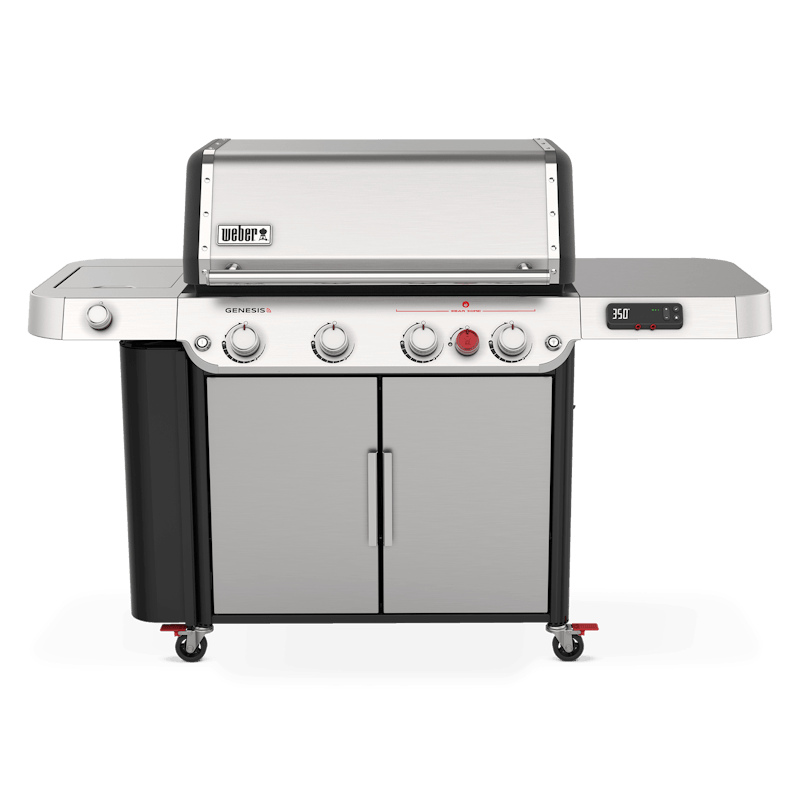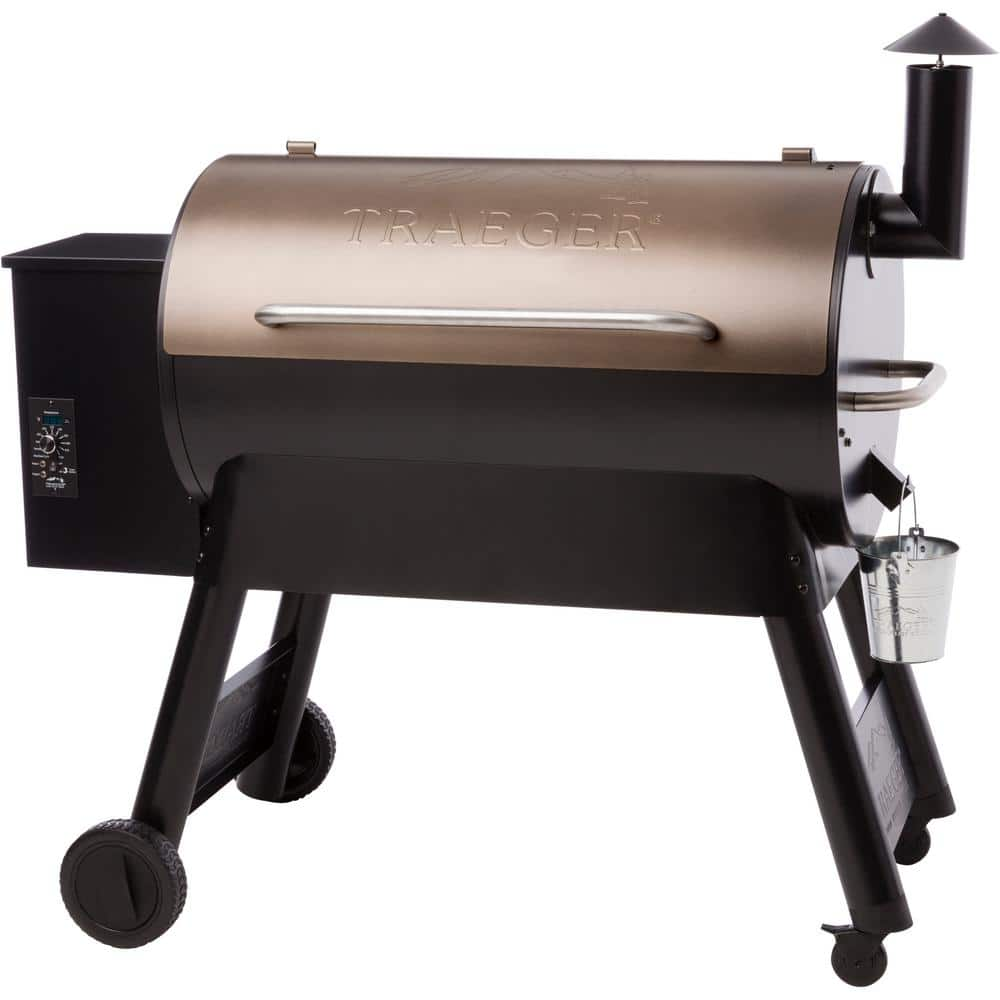Napoleon Prestige PRO 500 Propane Grill with Infrared Rear and Side Burners and Rotisserie Kit – PRO500RSIBPSS-3
Four stainless steel burners deliver impressive heat and longevity. Rear infrared rotisserie burner and rotisserie kit allows you to slow roast food with restaurant quality results.
- LED Spectrum Night Light control knobs with SafetyGlow
- Four stainless steel burners deliver impressive heat and longevity
- Rear infrared rotisserie burner and rotisserie kit allows you to slow roast food with restaurant quality results
- High heat infrared side burner allows you to sear just like a steakhouse while other dishes cook on the grill
- Cart has folding side shelves with integrated utensil holders, double doors for storage and easy roll locking casters
The Napoleon Prestige PRO 500 blends quality and performance into one package, and has the features to make every cooking experience exceptional. This freestanding propane gas grill has four stainless steel tube burners that provide up to 48,000 BTUs of cooking power. The grill has stainless steel cooking grates with 500 square inches of main cooking area and 400 square inches across the stainless steel warming area for a total of 900 square inches of cooking area. Easily turn the burners on with flame ignition for a reliable start up. The stainless steel wave cooking grids create the trademark Napoleon sear lines. The stainless steel, self-cleaning sear plates vaporize drippings, control flare ups and keep your food moist. The Prestige PRO 500 also has a 18,000 BTU stainless steel rear infrared burner for slow cooking with the rotisserie kit and a 14,000 BTU infrared side burner for searing meats. The hood features an Accu-Probe temperature gauge, stainless steel end caps and retains heat for oven-like performance. The LED Spectrum Night Light control knobs have near limitless color options making your night time entertaining a breeze, and they glow red when a burner is in use while two interior lights illuminate the grilling surface. A full width drip pan also makes clean up a breeze. The stainless steel grill cart also features a built-in ice bucket and double doors with soft close for storage and easy roll locking casters for moving the grill around. This Napoleon grill is manufactured in Canada.
Legal disclaimers and warnings
Product packaging, owners’ manuals, installation instructions, and/or operating instructions may include more information than what is shown on our website. The content on our site is intended to be used for reference purposes only. Please fully read all included manuals and documentation before installing or using this product. WARNING for California residents: this product may contain chemical(s) known to the state of California to cause birth defects, cancer, or other reproductive harm.
Additional information
| Dimensions | Width 66.5" |
|---|





by Alejandro
Excellent temperature control… allows you to cook to the desired level. Beautiful design with nice features and accessories.
by Vern
This is a really, really good grill! Love, love, love the infrared sear functionality and internal lighting that makes evening grilling SO much easier. I was especially grateful for being able to speak with knowledgable carbon-based life forms who were able to resolve a couple of set-up questions. These are people that know and care about great grilling! It has significantly improved the quality of my life! So what would move my rating from a 4 to a 5? Just a couple of tiny nits in the spirit of continuous improvement: 1. The trim rings around each of the burner knobs are easily separated from their anchors. A tighter fit of better glue would prevent this. 2. I have to keep a close eye on rotisserie chickens. The mounts for the motor have a tendency to flex. This can lead to a chicken that isn’t rotating. Beefier motor mounts might help. Take a bow for a job well done with this product. It is delivering great results 3-5 times a week.
by Sheawee
Wheels on the cart work very well on smooth flat surface but are an issue with sloped surface or stone pavers.
by Bob
I like the grill with 2 minor problems. The igniters don’t work for the side burner and the back burner. These are easy to light with a lighter stick.
by Emil
It just makes cooking easier and more consistent results are easier to achieve.
by Hugo
Ensure you have an electrical extension in order to use the electric start and the amazing show of lights and hood light!! If not, no problem, you can still fire it up, but no lights:( Construction of this grill is second to none.
by Lawrence
I was in the market for a high quality, sturdy, dependable grill to attach to my natural gas BBQ line. I did a ton of research and the Napoleon Prestige Pro 500 was highly rated and recommend. I was able to locate a local dealer who actually had stock and I bought mine right away. Assembly was easy and took a couple of hours to assemble. I wasn’t disappointed. I’m impressed beyond what this review can express. This grill has been used a lot since purchase and those who have seen it in action have also been impressed. The lighting, double rotisserie and searing zone are also beautiful features with this grill. If you want a high quality, sturdy grill with all the bells and whistles then this is your grill. You will not be disappointed!
by Jimmy
Love the grill. No battery’s to go bad. Just plug in. Good lighting inside but I would like to have the thermometer illuminate & a light shining on the side burner. I pretty much always seem to cook in the dark. My side burner igniter stopped working. The Neapolitan gets as hot as my old Webber but does not seem to sear well without using the side burner.
by Amy
This is the best grill we have ever owned. Even heating throughout, high quality workmanship and the lighting on the knobs is both fun and helpful. The only issue we have had is with the lights failing twice but Napoleon customer service was very helpful and shipped out the parts we needed to fix everything. My husband has never bonded so well with a grill…we’ve owned other very high end grills over the past 30 years and this one beats them all!!!